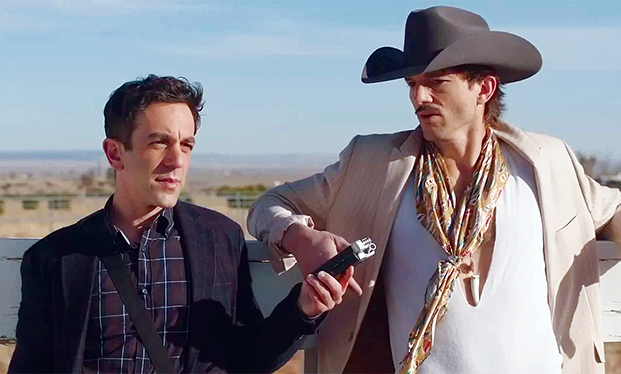
- Focus Features
There's a level on which Vengeance writer/director B.J. Novak—the veteran of The Office making his feature filmmaking debut—might be getting a little too meta for his own good. After all, it's a movie in which Novak plays a writer trying to develop a story about the way America is divided—a character written by Novak himself, in a story that's about the way America is divided. As the narrative sets up, the character's arrogance about thinking he can make such a grand statement is part of the joke at his expense. Meanwhile, Novak is doing it for real, right in front of our faces.
It's a pretty nifty trick that Novak pulls it off as well as it does. Buried inside a time-worn comedic premise is something that does poke and prod at the state of a divided nation, but even as it risks turning into an earnest example of "both sides"/"can't we all just get along" grandstanding, it finds a unique answer for the question it poses.
Novak plays Ben Manalowitz, a "blue-check" New Yorker contributor who's trying to make the leap from having a platform to having "a voice"—which, in 2022, naturally means trying to launch a podcast. He gets an unexpected opportunity when a middle-of-the-night phone call informs him of the death of Abilene Shaw (Lio Tipton), a woman that Abilene's brother Ty (Boyd Holbrook) believes to be Ben's girlfriend, but to Ben was just one of many casual hookups. Cajoled into attending Abilene's funeral in Texas, Ben learns that Ty believes the official cause of death for Abilene of a drug overdose can't be true. And suddenly Ben has an angle with a potential story about a dead white girl—"the Holy Grail of podcasting."
The mistaken identity/fish-out-of-water premise that has acerbic New Yorker Ben interacting with plenty of real-life Red State-ers feels like something set up for the Doc Hollywood treatment, where the cocky coastal elite learns What Really Matters after slowing down and hanging out with salt-of-the-earth folks. Novak establishes Ben's personality nicely with an introductory scene in which Ben and a buddy at a party barely make eye contact with one another, scrolling non-stop through their phones and responding to one another's every observation with a knee-jerk "100 percent." The table is set for a bunch of awkward interactions with Abilene's family members, or a philosophical local music producer (Ashton Kutcher), or a visit to a rodeo, all of which will serve to poke holes in Ben's self-regard.
For a while, that's absolutely where the second act feels like it's headed, including moments of Ben watching videos of Abilene and starting to see a real person where he'd previously just seen "a number in my cell phone." Fortunately, Novak is a clever enough writer that he builds a bit more spikiness into Ben's various comeuppances, like one of Abilene's sisters challenging him on the concept of "Chekhov's unfired gun" because she has actually read Chekhov plays. Vengeance isn't structured primarily for laughs, but Novak knows where to find them when he really wants to, including perhaps the best joke at the expense of Twitter that I've ever heard.
The build-up, however, is toward a couple of big speeches that end up exploring what's true about the stereotypes we might have about our fellow Americans—"head vs. heart" dichotomies, and the appeal of conspiracy theories—and why ultimately, those stereotypes might not be the thing that divides us most. Saying more would spoil a sense of discovery, but Novak shows a keen sense for how the way we communicate in the 21st century shapes the way we view the world, and the way we view other people—and how nothing might be more worthy of a violent response than the kind of fashionable nihilism that argues "nothing means anything."
That's not to say that Vengeance is the kind of movie that drops its truth-bomb finale with such force that it leaves you immersed in its complexities. Novak ultimately has too much of a comedy-writer's sensibility to believe he's formulated a new paradigm thesis for our times. Unlike Ben, however, he seems to want the things he writes to mean something, rather than just amplify his voice. For Novak, differentiating himself from his protagonist means understanding when it's time to listen.